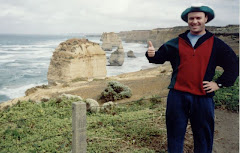Tips on Grammar, Punctuation and Style
Commas and semi-colons. If the rules you learned about commas and
semi-colons don't mean much
to you, forget them and try this: Read one of your sentences aloud and see where you would
naturally pause, where you would draw a breath. If it's a short pause, like that just was, you
probably need a comma. If it's a longer pause, but not quite a full stop (for which you'd need a
period), you probably need a semi-colon; remember that whatever follows a semi-colon must be able
to stand on its own, as a full sentence, like this one.
If you don't want your reader to pause, there shouldn't be a comma, there, because as, this
demonstrates it's very difficult to figure, out, what you're saying when your punctuation, makes the
sentence unreadable.
Your sentences shouldn't leave your reader hyperventilating from the constant shallow breaths that
over-punctuation requires. Nor should they be gasping for breath at the end of a long, unpunctuated
sentence. (Consider yourself responsible for your readers' cardiovascular health.)
Check your dashes and hyphens. When you're setting off a clause—this
one is a good example—use
the longer dash, called an m-dash. (You can indicate this dash with two hyphens—like this—if you
don't have an m-dash function on your computer.) Be sure that the parts of the sentence that precede
and follow the dashes would make sense even if you removed the dashes and the words they bracket.
(In the example above, the sentence is readable with or without the clause inside the dashes.)
You can also use the m-dash in place of a colon if you want to emphasize more dramatically the words
that follow: "The mantlepiece was lined with photographs of people she loved—her mother, her
grandmother, a favorite aunt." Or you can use it to add a surprising element into a sentence: "Her
family's photographs were displayed on the mantlepiece; there were pictures of parents, grandparents,
and siblings—and of Muffin, a Yorkshire terrier." Whereas the m-dash is used to set off parts of a
sentence, hyphens are used to join words together: broken-hearted, two-thirds, sister-in-law.
Always identify abbreviations before you use them, unless you feel reasonably confident that
the average intelligent reader would be able to identify the
acronym—like when the acronym is
more commonly used than the words it stands for. (It would be odd to write out all the words for ESP,
NATO, CEO, or AIDS.) Keep in mind the audience for the particular essay you're writing, though;
readers who are specialists in a particular discipline may not want or need to have terms spelled out for
them.
Try to avoid split infinitives. This is no longer a hard and fast
rule, and occasionally keeping an
infinitive together in a sentence can introduce more awkwardness than the split, but usually the split is
ungraceful. (Imagine: To be or to not be.)
Make sure all your referents are clear. When you say "This theory" or
"that point" or, simply,
"it," is it clear which theory or point you're referring to? When you use "he" or "she" or "these
critics," will your reader have to pause to figure out who all these people are?
There's more to say about this. We often throw in a "this" when
we're not entirely sure exactly
what we want to draw our readers' attention to, especially when we're making a complex argument
with many different elements. Sometimes vagueness in our language can be a symptom of muddled
thinking. So ask yourself, what does this "this" refer to? What words would I replace it with? If you're
not easily able to answer, you need to go back and work out your ideas in that section. (Readers will
never understand what you mean when you don't know yourself. When you notice vague referents, or
other apparently minor problems, take the opportunity to ask yourself if there might be any larger
problem lurking beneath your surface error.)
Never use "that" when you're referring to a person: "The first man
that
walked on the moon."
"The author that she was referring to." These are people, not objects—it's insulting to call them "that."
Use who or whom: "The first man who walked on the moon." "The author to whom she was
referring." Are you using "that" because you're shaky on the who/whom thing? See below. (And while
you're at it, consider whether you're twisting your sentences around to avoid any other grammatical
points you're uncertain of. If so, take control! Liberate yourself! Learn the rules once and for all so
you can write freely, instead of skulking around trying not to break the rules—or breaking them without
realizing it. Try starting a text file in which you list the rules you tend to forget, and keep it open when
you write. You can look rules up in any style manual, or come to the Writing Center.)
Who is what doing what to whom? That's the question you
need to ask yourself if you're uncertain
which word to use. The one that does the action (the subject) is
who. The one that gets something done
to it (the object) is whom.
Avoid passive voice. It tends to sap energy and power from your prose.
It's usually better to say
"Einstein's theory" than "the theory that was formulated by Einstein."
Italics and underlines. You can use one or the other but never
both. They mean the same thing—underlining used to be a copy-editing mark to tell printers to set certain words in italic type.
Underlining italics meant the editor wanted the words taken out of italics. So underlining your already-
italicized phrase is, in effect, like using a double negative.
Be sure all of your sentences have parallel construction. This
sentence doesn't have it: "Re-
reading my first draft, I notice it's trite, repetitive, and with no thesis." This sentence does: "Re-
reading my first draft, I notice that it's trite and repetitive, and that it has no thesis." Or you could say:
"Re-reading my first draft, I notice it's trite, repetitive, and lacking in a thesis." In the two examples
with parallel construction, you could take out any of the words in the list and still have the sentence
make sense.
Copyright 1999, Kim Cooper, for the Writing Center at Harvard University
For some exercises on the topcis above, visit the following websites:
http://oxforddictionaries.com/words/grammar-tips













